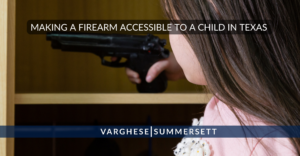Tarrant County 323rd District Court | Juvenile Court
In Tarrant County, child welfare and juvenile delinquency cases are heard in the 323rd District Court under the authority of Tarrant County Juvenile Board.
Tarrant County Juvenile Services (TCJS) is designated by statute to receive law enforcement reports of law violations defined as delinquent conduct or conduct indicating a need for supervision allegedly committed by juveniles ages 10 through 16. These cases are sent to the 323rd District Court, the Juvenile Court in Tarrant County.
Juvenile Defense in Tarrant County
If your child is facing a juvenile accusation in Tarrant County, we can help.

Lisa Herrick at Varghese Summersett is one of three Board Certified juvenile attorneys in Tarrant County. She’s experienced at defending every level of juvenile offense (including capital murder) in Tarrant County. Both delinquent conduct and conduct indicating a need for supervision is handled through the juvenile system.
What is considered delinquent conduct in Tarrant County?
Delinquent conduct is classified as Class A and B misdemeanors and felony-grade offenses.
What is considered Conduct Indicating a Need for Supervision in Tarrant County?
Conduct indicating a need for supervision includes Class C misdemeanors transferred from a justice or municipal court and includes public intoxication, truancy, running away, inhalant abuse, and violation of school disciplinary codes that result in expulsion.

How is a juvenile offense handled in Tarrant County?
Violations of the law that involve crimes against another person, weapons, or felonies are typically sent to the court services unit. The District Attorney’s office decides whether a petition of delinquent conduct will be filed.
If the DA files a petition, the case will be filed in the 323rd District Court, and hearings will be held before the District Judge or one of two associate judges. The child involved might be notified to come to the juvenile center to receive a citation for the hearing.
If no petition is filed, or if the child is recommended for Deferred Prosecution supervision, they are required to sign paperwork at the probation department. If so, any hearings will be canceled. The parents and the child, however, still have a few steps to make ahead of probation.
Each child must be represented by a lawyer during a hearing. The parent or legal guardian is responsible for hiring a lawyer. If not, a request for the appointment of a lawyer can be made by the parent or guardian. Parents, however, should try to retain a lawyer before seeking a court-appointed lawyer.
Tarrant County’s 323rd District Judge Alex Kim
Alex Kim was elected as Tarrant County’s 323rd District Court Judge in November 2018 and is up for reelection in November 2022.
Kim, a Republican, is the son of immigrant parents. He attended Wheaton College in Illinois and graduated from Baylor. He earned his law degree from Texas A&M University in 2006. He worked as an attorney at his own practice until running for office.
The Associate Judges under Kim are Cynthia Terry and Andy Porter.
Kim’s bailiff is Ed Wiseman: 817-759-7893.
Terry’s bailiff: 817-759-7894.
Porter’s bailiff is Bernie Powell: 817-838-4620.
The 323rd District court reporter is Kelly Pelletier: 817-838-4698.
The court coordinator is Stephanie Zanfino: 817-838-4647 and 817-838-4600 ext. 0677.
Her assistant court coordinator is Karli Young: 817-838-4600 ext. 0650.
Where to park at the Tarrant County Juvenile Court – 323rd District Court
Free parking is available at the Tarrant County Juvenile Court, located at the Scott D. Moore Juvenile Justice Center at 2701 Kimbo Road in Fort Worth.
Appropriate attire and behavior in 323rd District Court
Anyone attending the 323rd District Court should arrive at least 15 minutes early and be dressed appropriately. No overly casual clothing, shorts, tank tops, pajamas, or clothing promoting drug or alcohol use is permitted. Gang-related colors or accessories are also prohibited. Youths in detention must attend hearings in standard-issued detention clothing.
Weapons, including guns, knives, and weapon-like materials, are prohibited in court. Everyone entering the court is required to go through metal detectors.
Anyone near the courtroom should refrain from annoying behavior or doing anything that could damage the building.
Prohibited behaviors include yelling, cursing, spitting, and playing loud music. Cell phones must be turned off inside the courtroom.
Parents or legal guardians should work with the probation officer to find effective ways to encourage positive behavior from their child.
How does the juvenile court system work?
Juvenile court proceedings are divided into two hearings. Here’s a description of each:
- Part I: Adjudication hearing
During this hearing, the judge decides whether the alleged delinquent act was committed by the youth. If the judge rules that a delinquent act was committed, a second hearing will be held. The adjudication and dispositions are always scheduled for the same day and usually occur at the same time. In most cases, a social study is completed ahead of the adjudication of a case. This is a report the court will defer to in the second hearing. It is important to provide accurate information to the court services officer.
- Part II: Disposition hearing
The disposition hearing allows the judge to review the social study and rule on disposition, supervised probation, or committing the child to the Texas Juvenile Justice Department. The court considers multiple factors during these hearings, including a child’s prior history of law violations, resources available to the child at home, school adjustment, or identified special needs.
The Juvenile Court aims to develop programs and operations to divert youth from the juvenile justice system at the earliest appropriate point. The Juvenile Court endorses this belief by striving to identify the least restrictive environment for the care and rehabilitation of children while assuring community safety. TCJS has instituted a range of community and home-based programs as additional options aimed at reducing juvenile crime. The agency offers a wide range of services to children and families.
What is a social study history for a juvenile?
The report, which will be reviewed by the judge, summarizes the background on the teen’s behavior in the home, at school, and any potential history with juvenile services.
The report should include suggestions for treatment, consequences or outcomes that would most help the youth to succeed. For example, what has helped motivate the child in the past?
The report should include family history, school history, medical history, friends and relationships, and support and strength.
Family history:
- Current living situation
- Status of child’s relationship with family members
- Has the child run away from home? How many times?
- Has the family had any treatment or counseling in the past?
- How is your relationship with the child?
- Would you be interested in participating in a family-based treatment program focused on the child’s behavior?
School history:
- Does the youth attend school regularly? If not, when did this start?
- Does the child succeed in any school subjects or activities? What are their interests and strengths?
Medical history:
- Have any medical issues prevented the child from attending school and participating in other activities?
- Is the child currently using illegal substances (alcohol or drugs)? When did they start? When did you notice a change in their behavior?
Relationships:
- Are the child’s friends a bad influence?
- Does the child have any friends that are a good influence?
Supports and strengths:
- Does the child have any positive role models they look up to?
- Is the child involved in any community, school, or church groups that provide a positive outlet for them?
- In what activities does the child excel?
Is your child facing a violation? Call Board Certified Juvenile Attorney Lisa Herrick.
If your child has a case pending in the 323rd District Court, you need a strong advocate as soon as possible. Varghese Summersett’s Lisa Herrick has been fighting for children her entire career. Call her for a free consultation at 817-203-2220.



